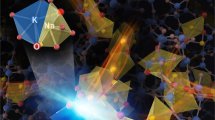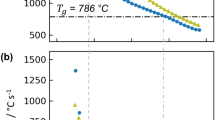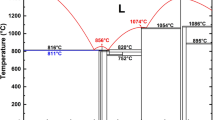Abstract
It has been accepted since 1932 that the building block of silicate glasses consists of silicon tetrahedrally coordinated to 4 oxygen atoms1. Although the existence of 6-coordinated silicon in a few crystalline materials, such as stishovite, and SiP2O7 is known2,3, the presence of (SiO6) units has not yet been observed experimentally in glasses. Recent X-ray diffraction and magic-angle-spinning (MAS) nuclear magnetic resonance investigations4,5 of SiO2-P2O5 glasses found only 4-coordinated silicon although SiP2O7 was produced by devitrification. Raman studies6 of Na2O-SiO2-P2O5 glasses were interpreted as indicating the presence of a structural unit containing Si-O-P bonding but otherwise unidentifiable. We have applied MAS nuclear magnetic resonance spectroscopy to similar glasses and here we report the first observation of [SiO6] units in glasses.
This is a preview of subscription content, access via your institution
Access options
Subscribe to this journal
Receive 51 print issues and online access
$199.00 per year
only $3.90 per issue
Buy this article
- Purchase on Springer Link
- Instant access to full article PDF
Prices may be subject to local taxes which are calculated during checkout
Similar content being viewed by others
Author information
Authors and Affiliations
Rights and permissions
About this article
Cite this article
Dupree, R., Holland, D. & Mortuza, M. Six-coordinated silicon in glasses. Nature 328, 416–417 (1987). https://doi.org/10.1038/328416a0
Received:
Accepted:
Issue Date:
DOI: https://doi.org/10.1038/328416a0
This article is cited by
-
The Synthesis of Cyclic Carbonates from Oxidative Carboxylation Under Mild Conditions Using Al/FPS Nanocatalyst
Catalysis Letters (2021)
-
Design of Refining Slag Based on Raman and NMR Spectroscopy Study for Removing Phosphorus for SoG-Si
Silicon (2020)
-
Effects of Six-fold Coordinated Silicon on Structure and Properties of BaO-SiO2-P2O5 Glasses
Journal of Wuhan University of Technology-Mater. Sci. Ed. (2019)
-
Formation of functional phosphosilicate gels from phytic acid and tetraethyl orthosilicate
Journal of Sol-Gel Science and Technology (2008)
-
Disproportionation of Qm (0 ≤ m ≤ 4) species in partially devitrified Li2Si2O5 glasses with small amounts of P2O5
Journal of Materials Science (2007)
Comments
By submitting a comment you agree to abide by our Terms and Community Guidelines. If you find something abusive or that does not comply with our terms or guidelines please flag it as inappropriate.



